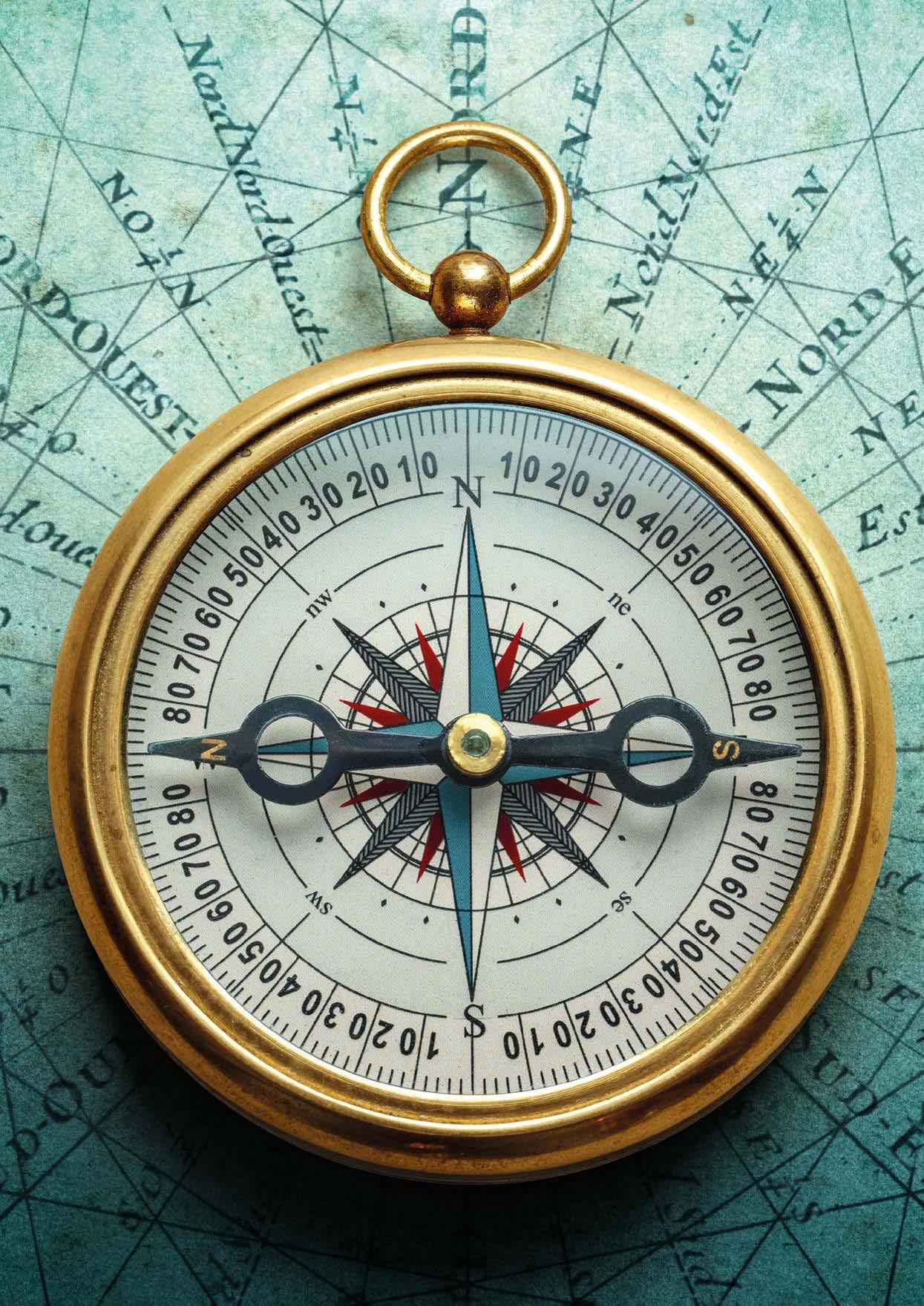
A 24-PAGE GUIDE TO COURSES & HOW TO GET THE BEST OUT OF YOUR DEGREE


A 24-PAGE GUIDE TO COURSES & HOW TO GET THE BEST OUT OF YOUR DEGREE

Our accredited human geography degrees equip you to make sense of a changing world — and make a difference in it.

• Top 100 globally for Geography*
• Accredited programmes to set you up for the world of work
• Fieldwork opportunities and professional placements available
Explore the issues shaping our societies, cities and environments — from climate change to inequality, and urbanisation to globalisation.
Together, we can chart a new path for people and planet.
Geography is an education for life and for living. It is a subject for the curious, the ambitious and the determined; the explorer, the change-maker, the deep thinker. Geography is present within everyone and everything. It encompasses how we see and interact with the world around us and helps us to understand our place within its complexity. It helps us to make sense of things and to see connections. Studying geography invites us to be more informed, sensitive and expansive thinkers, ultimately empowering us with the tools to shape real change that serves both people and our planetary home. This issue of Choose Geography is a celebration of geography as both a lively and purposeful discipline to study, and as a very rewarding career choice.
It is one of the most dynamic subjects you can study at university. As the world changes, geography responds and changes with it. This responsiveness is what makes geography such an endlessly interesting and, in all senses, vital discipline. A geography degree will place you at the forefront of cutting-edge research that is driving a deeper understanding of our world. Whether you’re curious to find out more about glaciers, rivers, earthquakes and climate change, or harness a greater understanding of political, cultural and social systems, there is a place for you in geography. Whatever themes or questions drive you, a geography degree will take you deeper and further, and leave you with advanced knowledge and skills that will reward you well personally and professionally.
A geography degree opens up doors to an unparalleled breadth of career opportunities. We know that employers

put a high value on geographers’ diverse skill set, cultural agility and acute understanding of systems and interrelationships, not least between people, place and environment. The knowledge and skills developed through geography are needed by business and industry across all sectors – including environment, construction, housing, international development and much more. The value of geographers is heightened by the UK’s ambitious plans to transition to a green economy, where new skills are needed in the workforce if we are to build a sustainable future.
This includes careers in green finance, environmental conservation, clean energy, and agricultural and other green technology fields. These are all sectors where geographers are top candidates due to their distinctive interdisciplinary and systems-thinking approach to the world’s most complex challenges. Geographers are well equipped with advanced digital skills, from programming and climate
modelling to managing data sets and using GIS. These digital skills are critical for keeping pace with an increasingly tech-centric world. It’s no wonder that geography graduates are more likely to be in full-time employment after graduating than those with degrees in politics, law, history, biology and psychology. But geographers succeed in the job market not just because they are good ‘doers’. They are also equipped to be sharp ‘whole system’ thinkers. The fact that geographers are trained not just to handle the tech, but also to pause and think critically about all dimensions of its application, makes them uniquely useful and adaptable in a fastchanging environment.
This issue of Choose Geography is written in collaboration with the Royal Geographical Society. The Society hosts a wealth of resources and free events throughout the year to support you in taking the next steps in your journey with geography; from helping you make a decision about choosing a university course that’s right for you, to introducing you to a range of inspiring professionals pursuing exciting careers with geography. You can check out all our upcoming events at www.rgs.org/studentevents.
I also encourage you to consider Student Membership, which unlocks discounted tickets for talks, seminars and events across the UK, including free tickets to our famous Monday Night Lectures, as well as providing access to journals and resources to immerse yourself in geographical thinking (www.rgs.org/joinus). I hope you enjoy this issue of Choose Geography, and hope it inspires you to study geography.



Become part of a vibrant community of students and staff making real-world impact by addressing past, current and future challenges in the fields of geography, environmental science and urban planning.
Study one of our unique undergraduate programmes and start your journey!
• Geography
• Earth Sciences
• Environmental Sciences
• Urban and Regional Planning
• Environmental Change and Sustainability
• Natural Sciences
Many of our programmes are also available with an integrated Masters, Year Abroad or Professional Placement Year. Field trip opportunities are available.
The University of Birmingham provides incredible support for students and encourages you to pursue your academic interests All the lecturers are eager to support you, and the university encourages and supports new ways of thinking and research within your final year research project.”
Alex Monkton, Geography with Placement Year
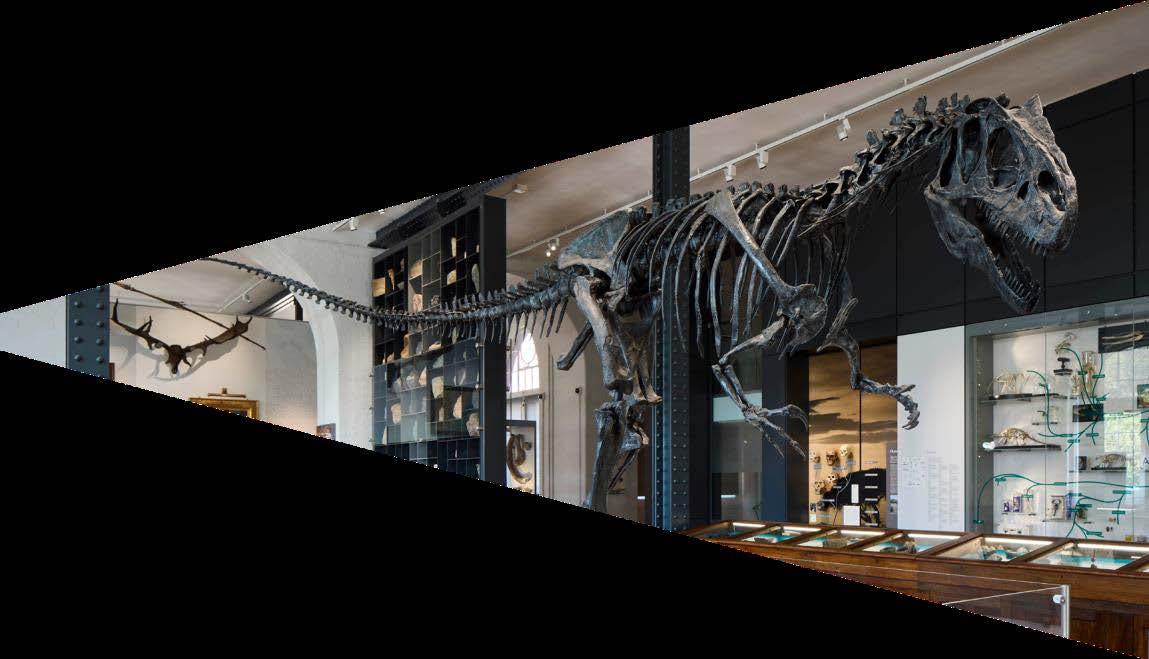

Across the social sciences, geography graduates are one of the most likely to be in a positive graduate destination, with 75% either in employment or full time study within 15 months of graduating. That surpasses graduates with a degree in history, politics, psychology, biology, computer science and law, according to The Complete University Guide. With the majority of graduates securing jobs across business and engineering sectors, geographers are considered highly employable – but what is it that makes them stand out from the crowd? We spoke to several organisations about why geography graduates are strong candidates across a wide range of sectors, from consultancy and finance, to humanitarian disaster response and social policy.
‘Geographers stand out because they bring a combination of analytical thinking, technological proficiency, global perspective, and environmental
‘Geographers excel in macro and micro systems thinking’
and social consciousness to the table. This makes them highly employable and equipped to tackle some of the world’s biggest challenges,’ says Alice Almond at MapAction. MapAction, a non-profit organisation that supports disaster preparation and response, places strong value on having a geography degree.
‘They [geographers] are well suited for roles in disaster management, preparedness and anticipatory action,’ Alice states. Many specialist volunteers at MapAction have geography degrees, as ‘geographers have the skills necessary to work in crisis situations, and their expertise in spatial analysis and data visualisation plays a critical role in providing actionable insights before and during emergencies,’ says Alice.
It’s no secret that geographers have a diverse skill
What makes geography graduates so employable? Continued
set that is favourable with employers. Geographers are proficient in data analysis, research and problem solving. They’re effective communicators with a global awareness of different cultural contexts, and are critical thinkers who are able to make sound judgements that are well informed and evidenced. Geographers have technical expertise and are highly data literate. These transferable skills are built throughout a geography education; its interdisciplinary nature equips geographers with a skill set that stands out from other social sciences.
At SLR (a sustainability consultancy), one in four of their 2025 graduate intake had studied geography at master’s or bachelor’s level. ‘SLR geographers possess a variety of skills that are important to our business, such as problem solving, critical and analytical thinking, report writing, data analysis, ability to work in a team, project management and planning,’ says Tracey, SLR’s Graduate Recruitment Lead. Geographers at SLR fill consultancy roles that span sustainable waste management, environmental management, ecology
Its interdisciplinary nature equips geographers with a skill set that stands out from other social sciences
and transport planning. Tracey goes on to say that ‘the diversity of the topics covered on a geography degree makes geographers strong candidates, as it can provide a good foundation in environmental and sustainability knowledge and understanding. They [geographers] demonstrate what we as an environmental consultancy are looking for in our graduates to be successful and play their part in delivering a quality project for our clients.’
It’s not a surprise that a high proportion of successful candidates at SLR are geographers, and this is a pattern that transcends the environmental consultancy sector. As the need for a green transition and delivery to net zero takes precedence, more organisations are looking
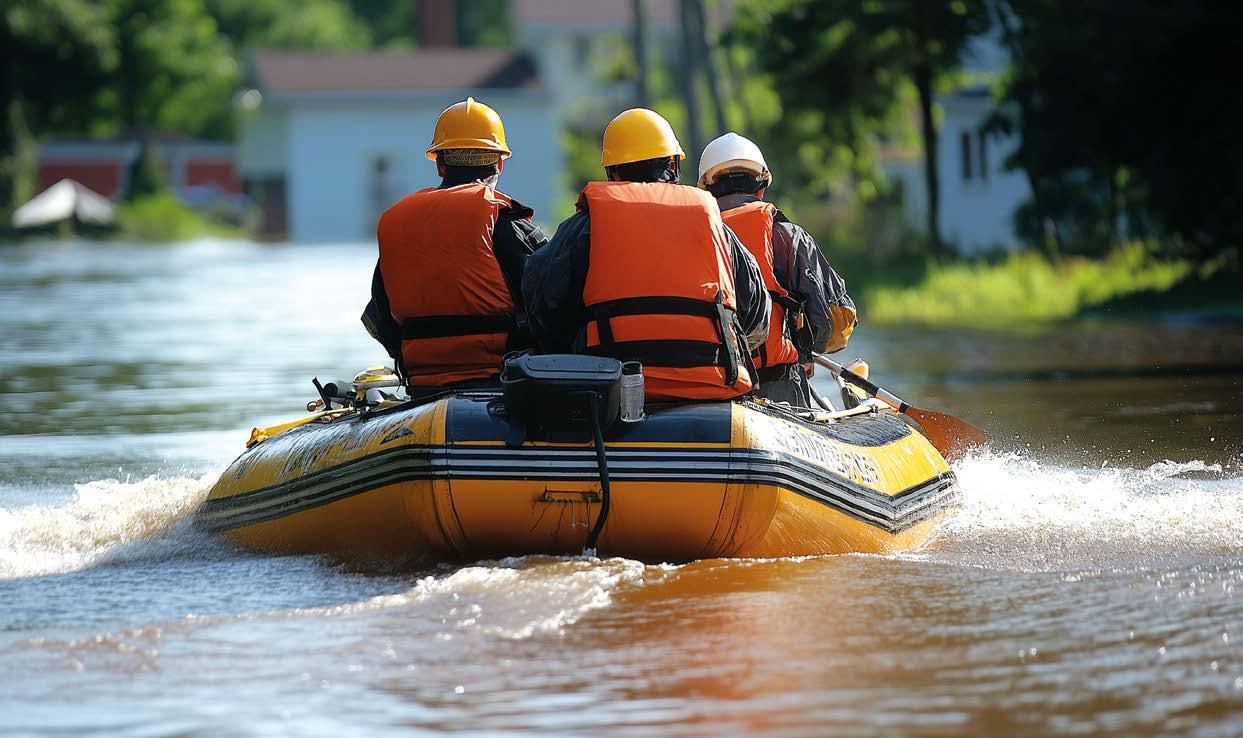
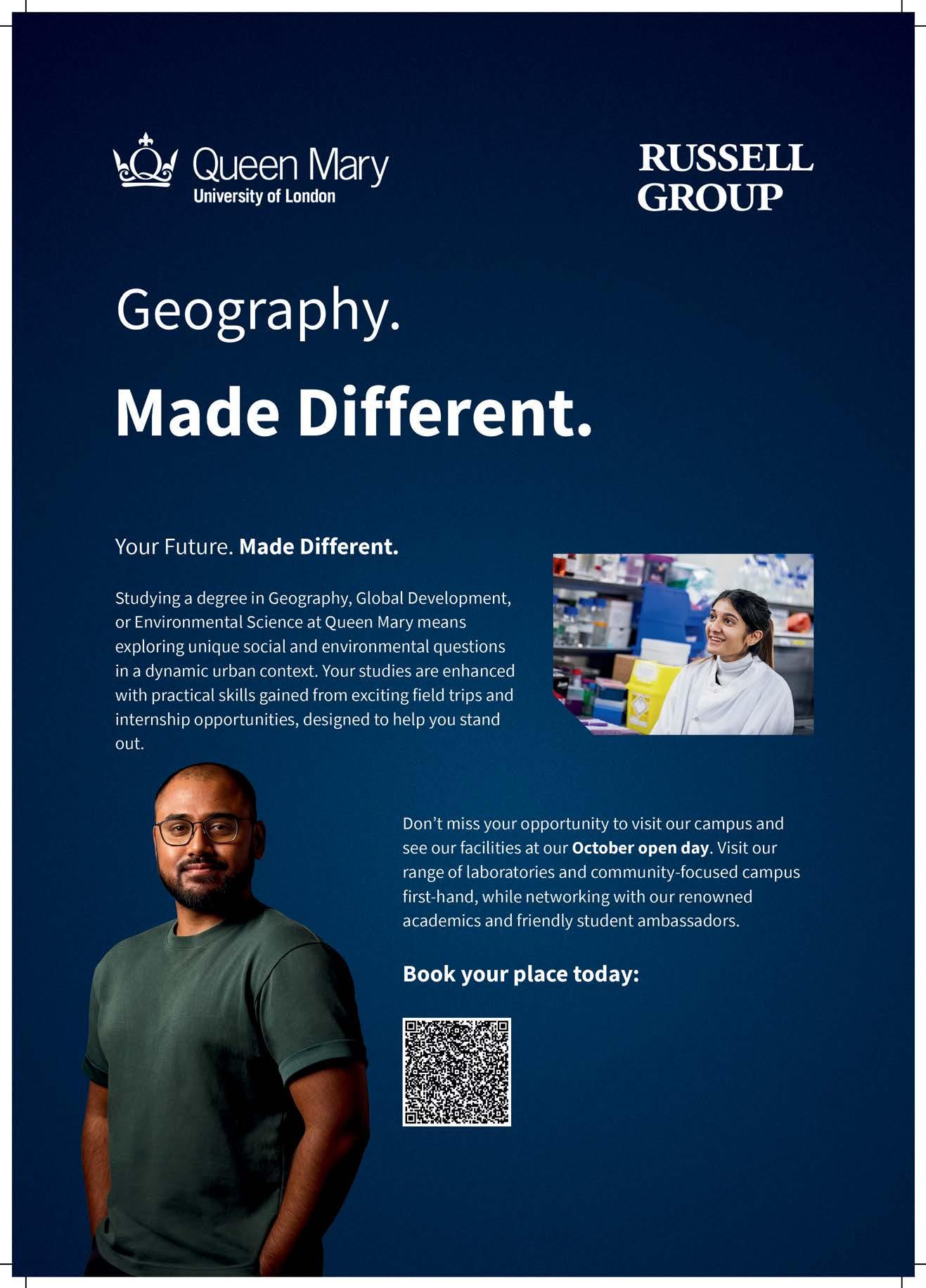
Explore our planet and develop solutions for a sustainable future

Apply now
to geographers for their proficiency in green skills, and capacity to understand what a sustainable future looks like for people and planet. The number of jobs available within the green sector is increasing, as industries expand to meet the standard required to deliver an ambitious green agenda (Department for Education, 2024). This is great news for geographers, broadening and diversifying career opportunities that align well with their multifaceted skill set and knowledge base. There truly is no better time to pursue geography – ‘geography is a great option to consider at degree level,’ confirms Tracey.
Not only are geographers highly skilled, but they are able to approach problems with a systems-thinking mindset. If you studied A-level geography you may recall the concept of ‘systems’ threaded throughout your studies; from open and closed systems in water and carbon units, to political and economic systems in global governance units. This distinctive way of thinking is highly desired by employers. ‘Geographers excel in macro and micro systems thinking,’ states Jonny Riggall, Associate Director at Aether (an environmental data consultancy). Jonny continues, ‘Climate change is complex; to understand complexity is the gift of a geographer.’
Geographers have an acute understanding of the synoptic relationship between people, place and the natural world. They are able to translate complicated data into digestible policy that leads to impactful action – which is needed now more than ever. ‘We have many geographers and geospatial practitioners [at Aether],’ says Jonny. Geographers stand out from the crowd due to their ability to create synoptic links across a diversity of topics. ‘I can usually spot a geographer by having a conversation that rambles from oceans to coasts, from coasts to cities, from cities to economics, from economics to poverty, from poverty to just transition, from just transition to climate, from climate to planet… and then back to oceans,’ highlights Jonny. This interdisciplinary way of thinking is unparalleled, and further emphasises why geographers are so valued across a range of sectors.
The data also speaks for itself – over one third of recent geography graduates secure jobs as business, HR and finance professionals. This includes roles such as certified accountants, finance and investment analysts and management consultants. Many work as engineering and building professionals, such as chartered surveyors or construction project managers, and over 61 per cent of geography graduates who choose further study complete a masters, many then landing jobs as environment professionals (What do graduates do? 2024/25) This destination data emphasises that a geography degree gives you the freedom to explore a range of career pathways that align with your passions, interests and talents.
As further emphasised by Alice, Tracey and Jonny, geographers are top candidates for some of the most sought-after careers. It’s evident that pursuing
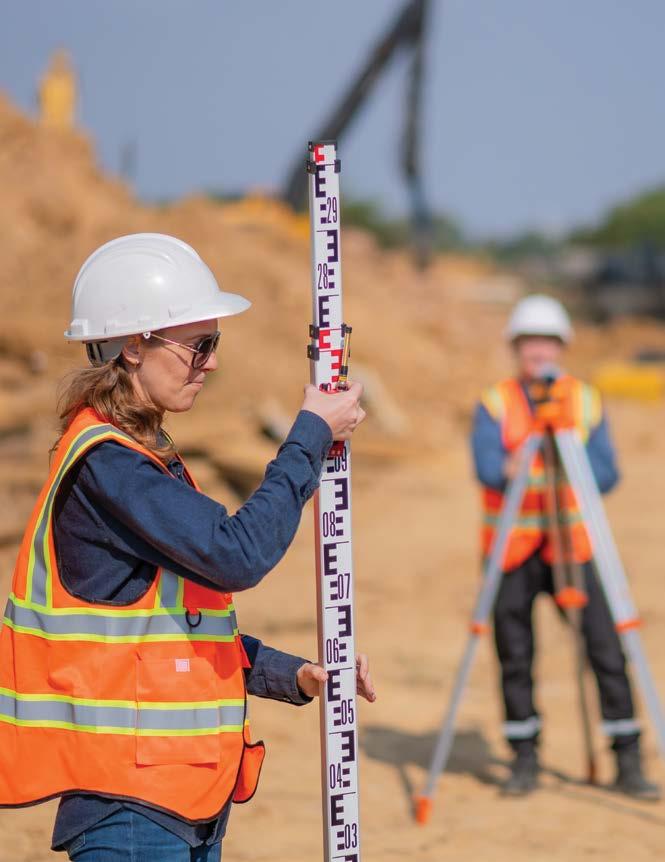
‘Climate change is complex; to understand complexity is the gift of a geographer
geography unlocks access to top career destinations, secures some of the highest employment rates across the social sciences, and opens the door to some of the most prosperous, rewarding and necessary career pathways for the future of our society and planet. It really is hard to think of reasons not to choose geography – but if you’d like more support on deciding whether geography is the right fit for you, check out the Royal Geographical Society’s student support at: www. rgs.org/choose-geography. l
From taster lectures to campus tours, open days give you a real feel for life as a geography student
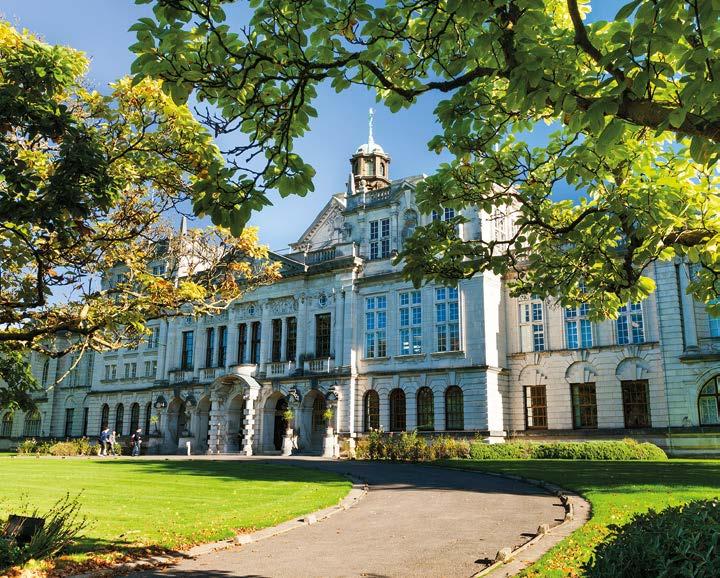
Making a choice about where to go to university can feel overwhelming. There are lots of things you can do to help you feel more in control of your decisions, and ultimately excited about this next step in your education. While universities hold a wealth of information on their websites about the different courses they offer, attending an open day allows you to get a feel for a university and whether it’s the right one for you. Universities hold open days throughout the year, and these are often aligned with school holidays and weekends, which means that you don’t have to miss a day of school to attend. Open days are free, and you can attend alone, with family or with friends. Usually, you must register before attending. Use the Royal Geographical Society’s open days directory to find registration links and a calendar of when universities are holding open days: www.rgs.org/opendays.
Open days tend to involve taster lectures or talks from subject lecturers to give you a sense of geography at university level. You can also visit accommodation and take a tour of the university campus. It’s a fantastic chance to ask questions, meet the geography department and find out what university life is like
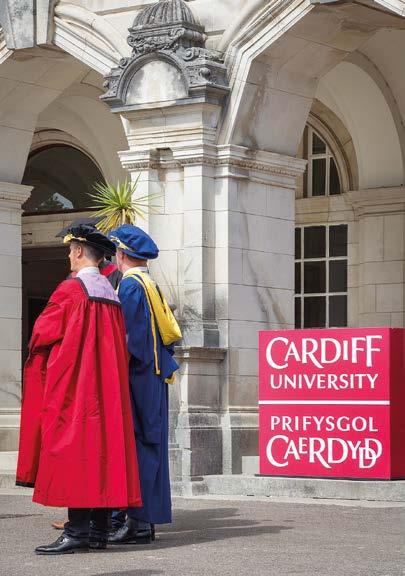
from current undergraduates. Most importantly, open days allow you to explore the new place that you might call home for the next three to four years.
To help you make the most of your university open day, make sure to bring along a few questions to ask tutors, staff and current undergraduate students. These might be questions about the course content and structure, or about societies and accommodation options. For example, you might want to ask about the specific topics you’ll study, how you’re assessed and what opportunities there are for fieldwork. This is also a great chance to ask what support a university has in place for funding, wellbeing and neurodiversity.
If you’re unable to attend an open day in person, many universities run online open days too. This allows you to get a better understanding of university life, and can give you a sense of what you can expect
Attending a university open day can help you make an informed choice about where to study, and empower you to make a decision that best aligns with your interests and future. Make sure to check out the Royal Geographical Society’s useful guide to university open days for more tips and advice: www.rgs.org/opendays.
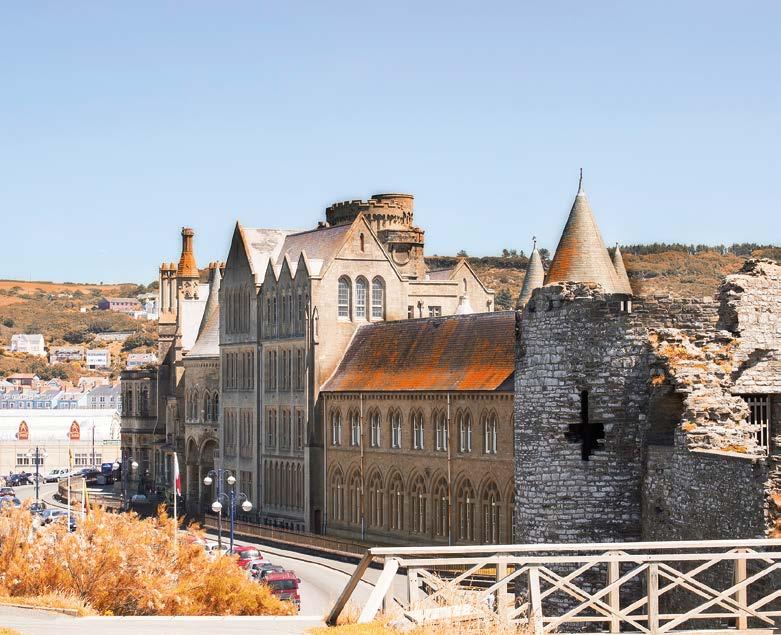


‘I went to open days at all the universities I was considering, and they were one of the most important factors in helping me decide. They gave me a real sense of the course, the lecturers, the campus –and the surrounding area. I really valued speaking to students already on the course, as well as lecturers. They could offer an honest, first-hand perspective on what studying there was actually like.’ — Katherine Wingfield, University of Sheffield

‘My open days were all online, because of Covid, but they still helped me get a feel for things – not just the courses, but also what accommodation might be like. I think the most important part of visiting or exploring a university is that gut feeling you get. You need to walk around and ask yourself: can I really imagine living and studying here? Sometimes, you just know the answer straight away.’ — Cameron Powell, Durham University
Making the most of your university open day:
l Think about the whole package. It’s not just about the geography course, it’s about the place, the people and the support on offer.
l Location is important. Are you looking to live at home, or for more of a campus or city vibe? How much will it cost to travel home? Are there particular parts of the country you’d like to live in?
l Speak to as many staff and students as you can. By asking questions you will get a better feel for the university and course, and find out information that won’t be presented on websites.
l Accommodation and facilities should be explored. Your geography course is just part of your university experience. Making the most of time outside of study and living comfortably are also key to a positive experience.
l Visit the geography department. Speak to staff about research interests, course content, fieldwork and assessment. Make sure the course aligns with the geography you are interested in.

‘I only went to one open day – for Human Geography at Cardiff University – but it stuck with me so much that it became my top choice. I still remember walking through the grand entrance of the Geography and Planning building with its red carpets and gold handrails, and speaking with older students. Open Days can be a little overwhelming – in the best possible way.’ — Francesca Funnell, Cardiff University
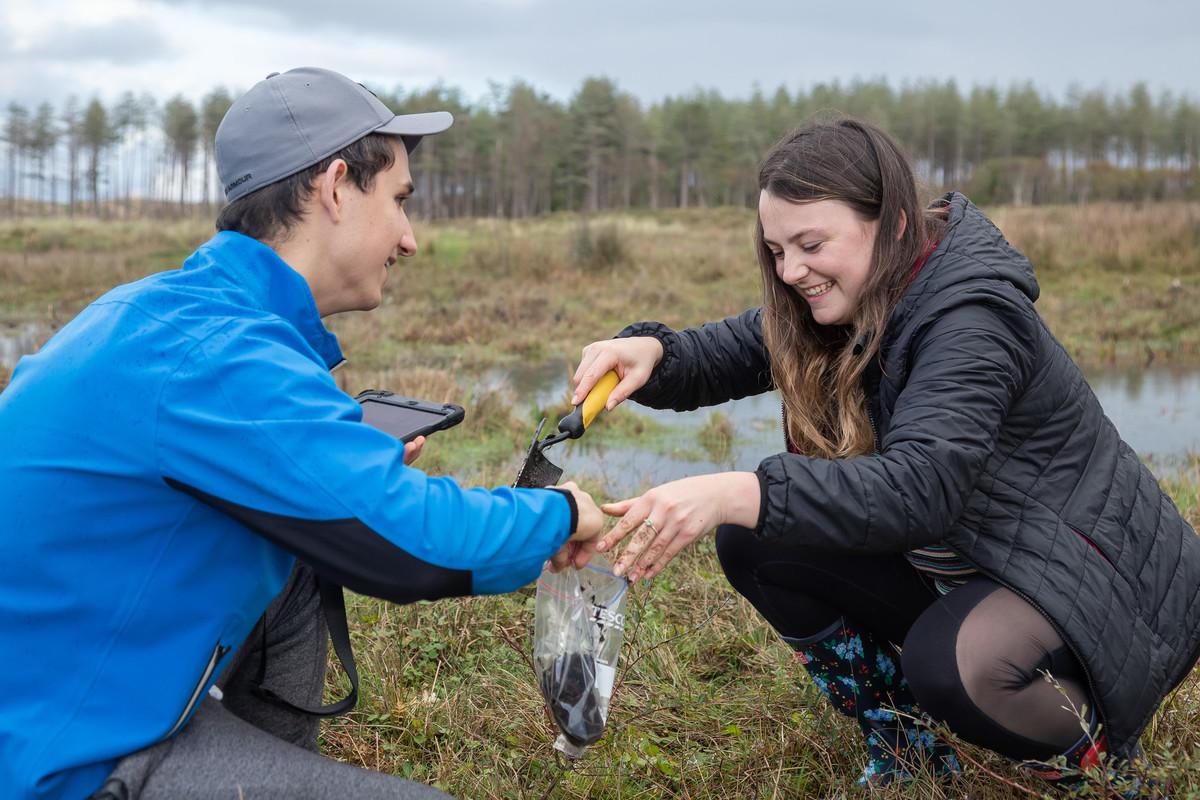
Gain the knowledge and skills to tackle global priority issues, such as the climate crisis, social inequality and hazard vulnerability, and play your part in creating sustainable futures for all.
• Geography BA / BSc (Hons)
• Geography with Year in Industry BA / BSc (Hons)
• Geography with Year Abroad BA / BSc (Hons)
Specialist pathways available in human geography, physical geography, or natural hazard management
1st in UK for student experience Times Higher Education 2025, Geography & Environmental Science
Work placements built in to every course
Fieldwork opportunities in each year of study
Career support from day one
Free language tuition
Five students share how their geography degrees sparked passions, built skills and opened doors to meaningful careers
Geography is one of the most relevant and dynamic areas of study today, offering insights into some of the planet’s most pressing challenges. Its broad scope means there’s a wide range of degree options –including human geography, physical geography, environmental science and climate change – all helping students to make sense of a rapidly changing world.
Human geography explores how people, places and power interact. Students examine cultures, economies, migration, urban development and geopolitics, gaining the tools to tackle major issues such as inequality, resource access and sustainable city planning.
Physical geography focuses on the processes that shape the Earth – from climate and ecosystems to hydrology and natural hazards. Students learn how landscapes evolve, how to manage natural resources, and how to prepare for environmental risks such as floods, wildfires and earthquakes.
Environmental science bridges physical geography and Earth systems to examine how humans impact

the planet. Students engage with urgent topics such as pollution, biodiversity loss, deforestation and water scarcity, and are equipped to design practical, sciencebased solutions.
Climate change runs through every geography degree. This inherently interdisciplinary subject gives students the understanding to confront global warming from multiple perspectives – scientific, political, social and economic – preparing them for careers that drive real impact in energy, policy, conservation and beyond.
Geographers don’t just learn about the world – they go out and explore it. Fieldwork and practical experience are core components of every geography degree. From environmental assessments to urban mapping, students apply classroom theory in real-world settings.
The case studies in this section highlight how geography students from across the UK are using their degrees to ask big questions, pursue their passions and prepare for exciting, meaningful careers. Whatever your interests, geography offers the knowledge and skills to help shape a better future.
Cameron Powell
Geography at Durham University
l I studied A-level geography, maths, physics and completed an EPQ. I’ve always been an academic person, so university felt like the right path for me. My parents didn’t go to university, so researching different courses and imagining what university life might be like was a big adventure. Geography was an obvious choice – I loved it – so I focused on course content, modules and field trips when narrowing down my options. Although Covid meant open days were online, I still got a good feel for the courses, accommodation and cities. The best advice I can give?
Ask yourself: can I see myself here?
At Durham, geography has been exciting and constantly evolving. It’s such a relevant subject – you begin to see it everywhere. I was especially drawn to glaciers and glaciation – these dramatic landscapes have shaped our planet, reflect contemporary climate change, and still hold secrets we’re only beginning to uncover. My favourite module was a final-year field trip to Iceland, where we carried out independent research surrounded by awe-inspiring landscapes. I’m now continuing this work with a research master’s studying glacial geology.
Francesca Funnell
Human Geography at Cardiff University/ • Prifysgol Caerdydd
l I made my decision about going to university by reflecting on my passions – writing, a strong interest in social justice, and connecting with others. When I thought about these things, it became clear that university was the next step for me. While I’d always had a sense I’d pursue higher education, it wasn’t until Year 13 that I began to take real steps toward it.
I only attended one open day – for human geography at Cardiff University – but it made such a lasting impression that it quickly became my top choice. I remember walking through the grand entrance of the Geography and Planning building and talking to older, confident students who brought the subject to life. They spoke about everything from gender and social justice to border spaces, race and power, and I knew I’d found a course I could really dive into.
Honestly, I never really saw myself as the academic type. I struggled a lot in school with confidence, but human geography was different – it took me out of my own self-doubt and got me thinking about the world. Social justice was something I was always drawn to, and studying human geography has let me channel that into a focus on gender justice and making cities safer for women.
One of my favourite modules has been Gender, Space and Place, which introduces feminist geography. We explored gender in relation to race, class, sexual orientation and more. One assessment was a gender journal, applying theory to our own lives. We looked
Mia Yearwood
Geography at Durham University

at themes such as power, care, identity, masculinity and embodiment – it was thoughtprovoking and personal.
Learning at university is so much more than sitting in lectures – it’s about finding your own rhythm. Some days it’s deep conversations in seminars; other days it’s hours in the library with a coffee. I’ve had lightbulb moments walking home listening to podcasts or chatting with friends about their courses. University has taught me that learning isn’t about memorising facts – it’s about building new ways of thinking.
Field trips are another highlight. In first year, we took day trips around South Wales, and in second year we visited Liverpool to study urban change and colonial legacies. In final year, we had the chance to go further afield on a European residential trip. The fieldwork brings lectures to life and is always planned with sustainability in mind – using trains and coaches wherever possible.
Human geography has helped me see cities and streets as layered environments where histories, cultures and everyday lives meet. I worked with a senior lecturer on a research project in Bristol and Plymouth, exploring how young people’s insights could inform safer urban design. That experience helped me secure an ESRC scholarship to continue into a PhD at Cardiff.
l The decision to go to university was an easy one for me. It always felt like the most natural and appropriate progression. Although there were moments during sixth form when I considered something more flexible, I reminded myself of my passion for my subject, the value of earning a degree, and the fact that three years is a short time – I’d still have plenty of opportunities to explore other interests afterward.
I attended a few open days and was lucky enough to participate in a summer school at Durham. Both were invaluable for gaining a sense of university life and insight into the geography course. I chose geography because it was the only subject that would keep me fully engaged. Geography is everywhere, so I was confident that my course would never run out of interesting topics and diverse perspectives on the world around me. I also found at school that geography was the one subject that encouraged me to think independently and form critical opinions – something I value greatly.
My favourite module has been social and cultural geography. The first lecture was a defining moment – it revealed how creative geographic knowledge production can be. We explored species, sexuality and (trans)gender, bodies, and age geographies, confronting many of society’s supposed ‘truths’.
Durham is a low contact-hour degree, so I only need to be on site for a few hours, two days a week. I tend to spend my mornings planning readings and afternoons studying with friends.

Katherine Wingfield
Geography at University of Sheffield l At A-level, I studied geography, history and biology. I’d always been interested in going to university, but I also explored apprenticeships and changed my mind a few times about which course to take –all geography-related.
I visited open days at all my shortlisted universities, which really helped me decide. Seeing the campus, speaking to students and lecturers, and getting a feel for the wider setting made a big difference. Hearing first-hand about the course and opportunities gave me real insight into what to expect.
Geography was always a favourite subject at school, especially at A-level. My interests are wide-ranging – from cultural and human topics to environmental issues – and geography allows you to study both. It’s also really relevant to global events and provides a strong foundation for different career paths.
My favourite modules this year have focused on sustainable development, particularly Global Sustainable Development and Who Gets What? (Social Justice and the Environment).
I found the social justice aspect really engaging – especially when we voted on the environmental topics we studied.
Field trips have been brilliant – we visited Castleton and Hope in first year and went to Berlin in second year to carry out independent research. I’ve also joined Geography Society trips to Lisbon and Prague, which were amazing.
Studying geography at university has developed my critical thinking, research planning and collaborative skills. The biggest difference from A-level is how much more independent and in-depth the learning is – especially when it comes to designing your own research project.
I’m looking forward to working on my dissertation about co-housing ecocommunities and continuing to explore career options related to sustainability. If you’re unsure about human or physical geography, don’t worry – many courses let you explore both before specialising.
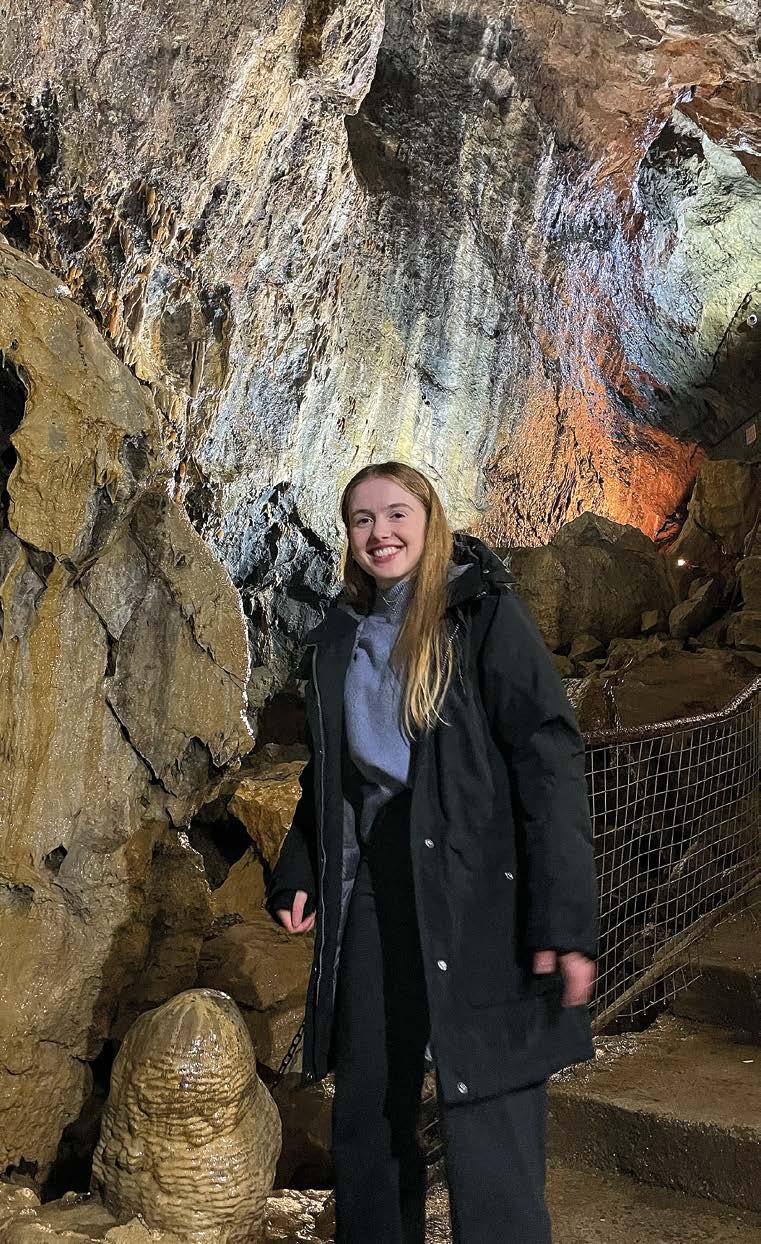
Why we chose geography

Zohra Wardak
MSc Environment and Development at Cardiff University/Prifysgol Caerdydd
l I’ve always been interested in different places and societies – which is exactly what human geography is all about. As a committed geographer, I’ve studied the subject at GCSE, A-level, BSc, MSc and, later this year, I’ll begin a PhD. Within my circle and community, it’s admittedly a niche discipline to pursue. I remember visiting my primary school teachers and explaining my degree – one of them quite candidly said, ‘Ooh, geography, how weird.’
But I’m a big advocate of trusting your intuition and following your truth. I’ve enjoyed every second of the past four years at Cardiff University’s School of
Geography and Planning – even the stressful times. When you’re studying something you love and relate to, it doesn’t feel like you’re studying – it feels like you’re developing an extension of yourself.
My experience at GEOPL has been exactly that. I love how much my geography degrees have given to me – but also how much of myself I’ve given back to them. It’s a subject that has allowed me to question the world. Everything I write about is a part of me: Islam, Palestine and Afghanistan have formed the focus of my BSc, MSc and PhD topics respectively. Studying geography has given me the knowledge and tools to make a difference to my intersectional communities. That’s why I’ve studied geography for four years at university – and why I’ll continue for another four.

Build the skills to tackle today’s biggest global challenges — from climate resilience to urban inequality.
Join a leading Russell Group university, ranked in the global top 100* for Geography, and Architecture and the Built Environment, and learn from experts at the forefront of sustainability, urban design, policy and planning.
Why study with us?
• Programmes accredited by the RTPI, RICS and CIHT
• Research-led teaching grounded in realworld impact
• Close links with industry, government and NGOs
• A supportive academic community with global connections
Geography graduates thrive across sectors. Their ability to connect people, places and problems makes them ideal for tackling today’s big issues – from climate resilience to social justice – with confidence, creativity and curiosity.
Geography isn’t just about maps and mountains – it’s a lens through which to understand the world, and a launchpad for a huge variety of careers. With skills in spatial thinking, data analysis, environmental awareness and social insight, geography graduates are uniquely equipped to solve the complex challenges facing our planet.
From urban planning to climate action, policymaking to project management, geographers work at the forefront of change – shaping smarter
Alice Almond Head of Training Services at MapAction
l I’m Head of Training Services at MapAction, where I lead our internal training for 80 specialist volunteers and support our external partners – from UN agencies to NGOs – in using geospatial data to improve humanitarian response. I design and deliver training programmes, manage partnerships, and oversee the day-to-day logistics of our training work.
My journey started with a BSc in geography at Southampton, followed by an MSc in water management at Cranfield. After uni, I couldn’t afford unpaid internships, so I began in an entry-level role at a small welfare rights charity – it gave me a solid foundation in the charity sector. Volunteering has always been part of my life, and through that network, I landed my first international development role in Nigeria. That led to a dream job in Lebanon as a WASH (water supply and sanitation) advisor for refugees, and eventually to Save the Children and now MapAction.
My role specifically focuses on helping local responders use GIS and mapping tools to build their own long-term resilience to disasters, rather than relying on international support. No-one understands the needs, culture, risks and resources of a community better than the people who live there, and I’m really passionate about putting power back in the hands of affected people.
My advice? Volunteer thoughtfully. Volunteering gives you real-world experience with the kind of work that charities do. It demonstrates your genuine interest and commitment to the mission, it develops key skills and it builds your network, which could lead to job offers or mentorships. This is a free and very rewarding way of gaining invaluable experience.
cities, supporting global communities, and helping industries adapt to a rapidly evolving world. Their training in Geographic Information Systems (GIS), research methods, and critical thinking makes them highly valued in roles across government, education, business, and the charity sector.
Geography graduates enjoy some of the highest rates of employment and job satisfaction. Whether designing sustainable transport networks, researching public health inequalities, or advising on disaster risk reduction, geographers are using their knowledge to make a real difference.
In this section, you’ll hear directly from professionals working across a range of industries –all of them using geography to inform their work and drive positive impact.


Denzel Manyande Operations Consultant
l I’m an Operations Consultant, but a simpler way to describe my work is Event Manager –which is where I started. Over time, my role has evolved and now I run a business specialising in project and operational delivery across sectors like healthcare, film and sport.
Most of my work is in sport, where I help clients turn their big ideas into reality. I manage events for thousands of people, from initial planning to live delivery, including sourcing venues and suppliers, scheduling staff, and ensuring everything runs safely and smoothly. I also consult on sustainability at major events, helping clients embed meaningful environmental practices into operations.
My route into this career wasn’t linear, but sport played a big role early on. I volunteered at the London Youth Games from age 16, gaining hands-on experience in everything from logistics to officiating. These moments helped me build the skills I use today.
Geography was an obvious influence. At A-level, I received a Royal Geographical Society Learning and Leading Scholarship, which opened my eyes to physical geography and shifted my focus. I went on to study a BSc in geography, specialising in environmental geography. My quantitative and critical thinking skills now support my sustainability work and behavioural change initiatives.
What I love most is the variety – no two projects are the same. One standout was launching a running concept with PUMA featuring DJs, lasers, mascots and, of course, running!
My advice? Start small and volunteer often. Regular volunteering helps build trust, skills and relationships – my own journey from volunteer to paid roles proves it. Geography teaches you to see both the big picture and fine detail – perfect for anyone interested in creating experiences that are both exciting and responsible.
Johnny Riggall Carbon Management Consultant
l I support corporations, local authorities, and governments with their actions to improve their environmental performance. I also get drawn into supporting organisations in understanding what ‘sustainability’ might mean to them to help them deliver a just transition.
From a young age I was always outside, so I got involved in things like setting up an environmental group at school and volunteering with the National Trust and the British Trust for Conservation Volunteers. My A-levels, including geography and biology, supported my passion, alongside hobbies like the Duke of Edinburgh Award.

A newspaper article about the adoption of the UNFCCC in 1992 first sparked my interest in climate change. I even went to a careers adviser and asked how to become a climate scientist – in 1992, that wasn’t on the 1, 2, 3 list of sensible career options. So instead, I studied environmental archaeology, which looks at how climate change affected our ancestors. When I graduated, there was no such thing as a sustainability or climate change job. I started out in marine conservation in the Caribbean and pollution prevention in the UK. Then, with new policies like the Climate Change Levy, carbon management consultancy was born – and that’s what I’ve been doing for the last 25 years. Systems thinking is a superpower of geographers. We’re ‘specialist generalists’, as one colleague puts it – able to see the big picture and the roots beneath. I like this term because, in a world where specialisation is often emphasised, it takes dedication and learning to be a generalist, more so than a pure specialist.
There’s no other home for real systems thinkers. I don’t think I learnt to be a geographer, it’s just what I am – a geographer.
Geographers in action

Madeleine Thompson
Sustainability and Climate Sales Specialist at MSCI
l I’m a Sustainability and Climate Sales Specialist at MSCI, where we provide financial market data and analytics. My role involves speaking to investors, understanding their strategies, and helping them use sustainability and climate data to guide their decisions. My clients range from asset managers to insurers and specialists in carbon markets.
My path here wasn’t traditional. I took two years out before university, first working in UK Parliament as a political researcher around the time the UK committed to Net Zero by 2050. That experience really sparked my interest in how sustainability and politics intersect – a very geographical perspective. I then travelled through Southeast Asia and Australia, became a qualified yoga teacher in Bali, and later studied geography at university.
Along the way, I interned in academia as a microplastics research assistant and worked as a policy analyst in carbon markets. I’ve also spent time volunteering and teaching English abroad in Poland and Greece.
I have always been fascinated by the world we live in and, for me, geography fundamentally seeks to understand this. Geography studies everything from the geopolitical dynamics we read about in the news, to the natural ecosystems we are intimately dependent on. With the current market we are in, and the pressures investors are facing, a holistic appreciation of human and physical phenomena is critical to understanding how organisations think and operate. Geographers are trained to connect the dots between physical and human systems, and that’s exactly what this job requires.
No day is the same. I’m often on calls with clients, strategising with colleagues or researching the market. What I love most is the variety –from exploring biodiversity risks to modelling different climate scenarios.
Buisness, HR and Finance
Engineering, Building and Technicians
Education
Marketing
Legal, social and health Managers
Information technology
Clerical and secretarial
Arts
Other occupations

Mateen Sedenu Senior Energy & Carbon Analyst at Salix Finance
l I’m a Senior Energy & Carbon Analyst at Salix Finance, where I assess public sector decarbonisation projects – primarily in schools, hospitals, and local authority buildings. I make sure they’re technically feasible, deliver value for money, and achieve meaningful carbon savings. I currently lead the technical delivery of a £20 million Welsh Government loan scheme focused on decarbonising education buildings. I’ve helped shape the scheme’s priorities –emphasising heat decarbonisation and fabric-first principles – and taken on wider responsibilities in programme development. My dayto-day involves technical reviews, data analysis, and stakeholder engagement, as well as managing a team and an external consultancy.
I studied geography at the University of Manchester, writing
Maeve Brittle
Graduate Trainee at Forestry England
l I’m a Graduate Trainee at Forestry England, working on projects that support both my development and Forestry England’s mission – caring for the nation’s forests for people to explore and enjoy, for wildlife to thrive and for a sustainable source of timber. The role gives me a lot of responsibility, which is fantastic for growth.
I started out in the East Forest District, which stretches from Kent to Norfolk, and worked on everything from staff welfare and wildfire response mapping to managing mountain bike trails and reviewing forest plans. These plans are essential for making sure we carefully manage forests and woodlands. Now, I’m part of the national team, where I work on national-scale projects and policies. One current project
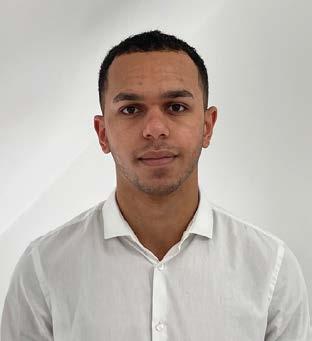
my dissertation on the impacts of oil exploitation in the Niger Delta. An internship at the Royal Geographical Society introduced me to sustainability work and kickstarted my career. I went on to work at a start-up on a pilot energy monitoring project in schools, then joined Salix, where I’ve moved through analyst roles to my current position. I’ve also gained a CMI Level 5 Certificate in Management

involves estimating which tree species we’ll plant most over the next 50+ years, factoring in climate change, pests and disease – it’s about future-proofing the nation’s forests.
I studied geography at the University of Cambridge during Covid, which meant I missed a lot of fieldwork –something I’ve always loved. After
and Leadership and a BREEAM Associate credential.
Geography is central to how I think. Concepts like soft landings, which I’ve written about, shape how I deliver projects. Geographical thinking helps me interpret data in context – linking people, place and policy to ensure projects actually work for those they’re designed for. I enjoy the mix of technical work and sustainability impact. Leading the Wales Digarbon loan scheme has been a highlight, as has designing the Salix Heating Load Tool. Seeing these projects make a difference is incredibly rewarding.
My advice? Be proactive, stay curious, and say yes to opportunities – volunteering, internships, writing or leading. Geography provides the tools to drive change across sectors, especially in a world increasingly shaped by climate and sustainability challenges. It’s such a broad field that you’re never limited to one area, and your career can take many different, exciting paths.
university, I became a teaching assistant, which helped me build people skills, but I knew I wanted a job that used my degree. I’ve always loved the intersection between human and physical geography, and forestry is full of those interactions. When I saw this job advertised, I knew I had to apply.
Geographical thinking is vital in this role – we’re constantly balancing priorities like climate, people, and wildlife. I love the variety – I might be working on a recreation policy one week and a data analysis project the next. One highlight was creating a cycle plan for a forest in the SouthEast, which involved GIS, stakeholder engagement, and site visits, all while balancing recreation with conservation.
If you love the outdoors, care about people and the environment, and want a career with real-world impact –geography is for you.

l Looking for further support around choosing geography at university? The RGS-IBG ‘Choose Geography’ materials provide information on why studying geography is a great choice. Their online support provides insight into the essential and transferable skills developed through studying geography that employers regard highly as well as advice on how to apply successfully, and support with the UCAS process. Their support encourages you to
ask the right questions and explore the whole package a university can offer, as well as other elements to consider such as fieldwork opportunities, course structure and overall student experience. The RGSIBG has a directory of geography courses and a directory of open days, so you can explore your options and see what’s available. You can also discover the careers into which a geography degree might take you by attending one of the Society’s free
webinars or exploring what geographical work experience options there are available through our work experience directory. If you’re interested to see what your favourite universities are offering for school students, you can take a look at the RGS-IBG university outreach pages- many universities offer student events, summer schools, scholarships and more. Find out more at: www.rgs. org/choose-geography.

l Thinking about studying geography at university? Geographical is here to guide and inspire you. Our Study Geography hub is packed with practical advice, thought-provoking features and first-hand stories to help you make the right choice – whether you’re exploring undergraduate degrees or thinking
about a master’s.
You’ll find our searchable degree and master’s directories, packed with course options across the UK, alongside career insights and tips on how to turn your passion for geography into a fulfilling future. Want to know what geography graduates actually do? Our career case
studies share real-world examples of people using geography to shape change. Whether you’re curious about fieldwork, or just need help navigating your options, we’ve got resources to help you explore, compare, and take the next step with confidence. Find out more at geographical.co.uk/study-geography.

Explore our planet - its climate, environments and cultures.
At a University ranked 1st in the North West for teaching. (Guardian University Guide 2025 - Geography)
Find out more at ehu.ac.uk/geography or scan the QR code.

Study Geography in a stunning location between the mountains and the sea, and learn from the wealth of natural and built environments right on our doorstep.
We offer a range of courses accredited by the Royal Geographical Society in one of the oldest Geography and Earth Sciences departments in the UK.
Our lecturers are internationally recognised researchers who lead projects across the globe, while actively teaching and supporting our students.
We provide a range of flexible learning opportunities and arrange field trips to outstanding landscapes both locally and abroad.
Courses
BSc Geography (also available in Welsh) *
BSc Physical Geography *
BSc Environmental Earth Science
BSc Environmental Science
BA Human Geography *
BA Sociology
MSc Remote Sensing and GIS
MSc Behaviour Change
MA Society and Space
* Accredited by the Royal Geographical Society

(Good University Guide 2025, The Times and Sunday Times)
Top 10 in the UK for Student Experience and Teaching Quality for the subject of Geography & Environmental Science
(Good University Guide 2024, The Times and Sunday Times)
Top in Wales for Student Satisfaction for 10 consecutive years
(National Student Survey 2025) Discover more at an Open Day: 11 October 2025 8 November 2025